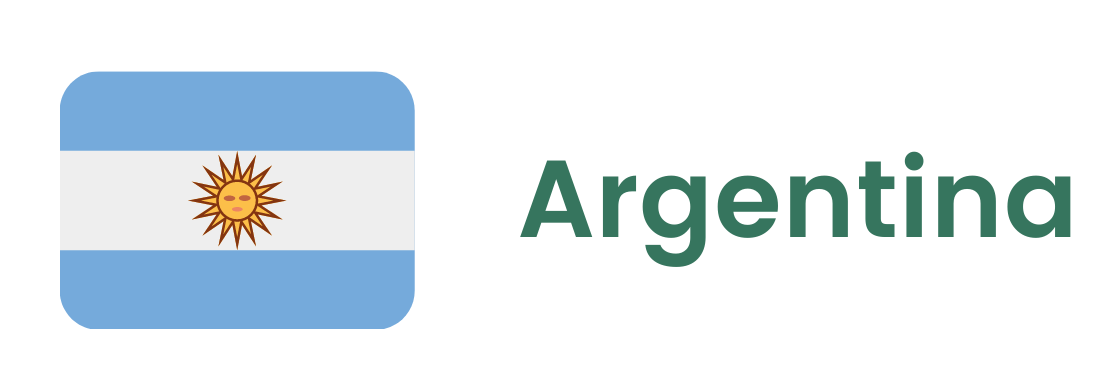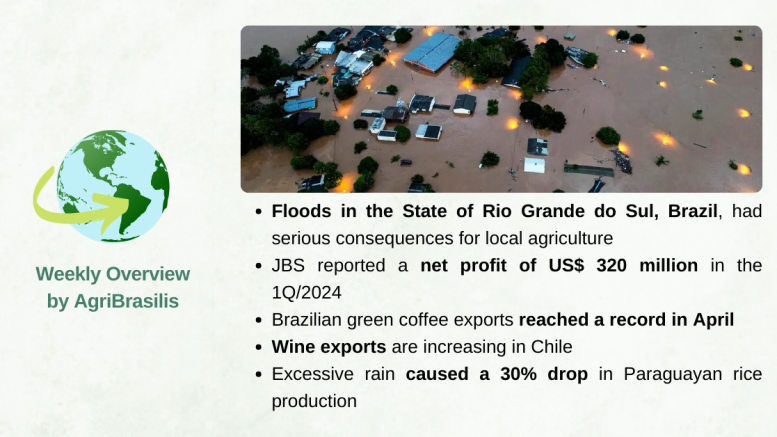Argentina’s Annual Inflation Was 289.4%

Monthly inflation fell to 8.8% in April, the 4th consecutive month of decrease. Monthly inflation recorded in March was 11%. Annual inflation was 289.4%, highest level since February of 1991. (Indec)
“Breeding of Jersey cattle is expanding a lot in Argentina… 14% of the Argentine dairy herd has Jersey genetics”, said Agustín Robredo, president of the Argentine Association of Jersey Cattle Breeders. “The price that the industry pays for the ‘solids’ in milk (fat and protein) is important, and the breed produces milk with approximately 10% of solids… Currently, we do not compete on a liter versus liter basis, but on the production of [milk] solids per hectare”. (Argentine Association of Jersey Cattle Breeders)
In response to inflation, Swift Argentina, a Minerva Foods company, will freeze and even reduce prices of its most consumed products for 60 days. Other companies, such as Carrefour, Quilmes and Chango Más, have also announced similar measures. (Swift Argentina)

Floods in the State of Rio Grande do Sul had serious consequences for local agriculture, particularly for corn. According to Itaú BBA, the harvest of the first corn crop in the State of Rio Grande do Sul reached 86% by the end of last week. With an estimated production of 5.1 million tonnes, around 870,000 tonnes were still in the fields when the floods began. Unharvested areas are now at risk of loss due to flooding and damages from excessive humidity. (Itaú BBA)
According to Instituto Rio Grandense do Arroz (State of Rio Grande do Sul Rice Institute), as of May 8th, 82% of the area planted with irrigated rice had been harvested, leaving 142 thousand hectares not harvested. Of these, 23 thousand hectares were completely lost and 18 thousand hectares were partially submerged, leaving only 101 thousand hectares unaffected by floods. (IRGA)
President of Brazil, Luiz Inácio Lula da Silva, said that he will issue a provisional measure to allow rice imports from countries such as Bolivia, Paraguay, Uruguay and Argentina with the aim of reducing the price of the product in Brazil. (Government of Brazil)
Agribusiness exports from the State of São Paulo increased 18.6% in the first four months of 2024, compared to the same period of the previous year, totaling US$ 9.37 billion. Imports also grew, reaching US$ 1.86 billion, an increase of 7.5%. Agribusiness exports represented 42.8% of total SP exports from January to April. (São Paulo Department of Agriculture)
JBS reported a net profit of US$ 320 million in the 1Q/2024, reversing a loss of US$ 280 million that was recorded in the same period last year. Profit was boosted by results from poultry meat units, amid strong demand and lower feed grain costs. (JBS)
National Supply Company raises forecasts for 2023/24 soybean and corn harvests due to adjustments in cultivated area. In the new survey, the 2023/24 soybean harvest was estimated at 147.68 million tonnes, compared to 146.52 million tonnes predicted last month. For corn, total production was estimated at 111.63 million tonnes, against 110.96 million in the previous estimate. (Conab)
Brazilian green coffee exports reached a record in April, totaling 3.9 million 60 kg bags last month, an increase of 60.8% when compared to the same period of 2023. The result is explained by good supply, favorable prices and good international demand. (Brazilian Coffee Exporters Council)
Planting of corn in the State of Mato Grosso do Sul has ended, being four weeks late when compared to the 2022/23 season. Almost 60% of crops were classified as in good condition. “In the second corn harvest of 2023/24, we observed significant losses in production potential due to water stress. This adverse situation affected a total area of 474 thousand hectares in several regions of the State, including the south, southwest, center, west, northeast, south border and southeast. Dry periods occurred between March and April (10 to 30 days of water stress) and more recently, between April and May (10 to 20 days without rain)”. (Famasul)


Wine exports in the 1Q/2024 increased by 8.9% in volume and 3% in value. 183.2 million L were sold, for US$ 365 million. Growth occurred in January and February, while in March shipments fell 7.8% in volume and 12.7% in value compared to the same period in 2023. (Odepa)

Transition from El Niño to La Ninã could cause higher temperatures in coffee farming areas in Colombia. Some regions may show a reduction in rainfall. (CPC; Hedgepoint Global Markets)


State of Jalisco ended up not planting 100,000 hectares of corn due to low prices and drought, according to Roberto de Alba, president of Jalisco Agrifood Council. There should be a drop mainly in the production of corn and wheat”, according to him. (CAJ)

Excessive rain caused a 30% drop in the country’s rice production, according to an estimate by the president of the Paraguayan Federation of Rice Farmers, Ignacio Heisecke. “Like Brazil, Paraguay is also going through extreme weather situations… and in April we had a record of 350 mm of rain in 24 hours”, said Heisecke. (Paraguayan Federation of Rice Farmers)
Paraguay has obtained authorization from Canada to export beef. Decision comes after almost three and a half years of negotiations. “This will have a tremendous impact on the economy…” said the Minister of Agriculture, Carlos Giménez, who highlighted that Canada is among the world’s 10 largest beef importers. (Ministry of Agriculture)
Low soybean prices reduced foreign exchange inflow, although Paraguay exported a greater volume of soybeans in the first four months of 2023, compared to the same period in 2023. In April, soybean exports reached US$ 1.33 billion, compared to US$ 1.48 billion in the same month of 2023. (Capeco)
Oilseed processing showed improvements in the 1Q/2024. Oilseed grinding reached 757.5 thousand tonnes, 200 thousand more than the average of the last three years for the period. (Cappro)

READ MORE:

